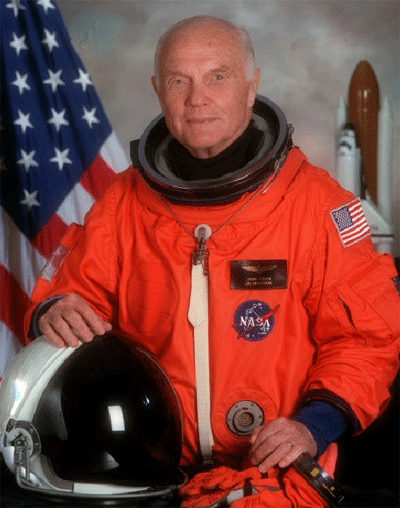[/caption]
US spaceflight legend John Glenn has weighed in on the current human spaceflight debate, releasing an 8-page paper outlining his feelings and a potential plan to allow US astronauts to keep launching on US vehicles. While Glenn supports President Barack Obama's plan to extend operations of the International Space Station and to forego returning to the Moon for the time being, he thinks retiring the space shuttles at this point is a mistake.
"The world's only heavy lift spacecraft and the U.S.'s only access to space should stay in operation until suitably replaced by a new and well tested heavy lift vehicle," Glenn wrote. "The Shuttle system is working extremely well, has had systems upgrades through the years, and has had "the bugs" worked out of it through many years of use. The Shuttle is probably the most complex vehicle ever assembled and flies in the harshest of environments. Why terminate a perfectly good system that has been made more safe and reliable through many years of development?"
But Glenn said the US also needs to develop heavy lift capability, and do it sooner rather than later. And while he supports the plan for NASA to contract with commercial companies to ferry astronauts and some cargo to and from the ISS, he also said NASA can't rely solely on commercial space vehicles, which at present are unproven in their reliability.
Keeping the space shuttle program going would cost about $1 Billion a year. "That is a very small price to pay for maximizing the benefits from a $100 Billion national investment, and may even be cheaper than the final bill from the Russians," Glenn said.
He blames NASA's current predicament on Congress for not adequately funding the Constellation program.
He erred, however, in his statement that the "U.S. for the first time since the beginning of the Space Age will have no way to launch anyone into space - starting next January." NASA did not launch humans into space from July 1975 to April 1981 – the end of Apollo and Skylab until the beginning of the shuttle era, as well as when spacecraft were grounded following the Apollo 1 fire in 1967, the
Challenger accident
in 1986 and the Columbia accident in 2003.
Glenn is the latest former astronaut to join the debate on NASA's future and while some ex-astronauts are staunchly against cutting the Constellation program to return to the Moon, and others wholly endorse the plan, Glenn seemingly takes a middle ground.
Here are his suggested objectives:
Extend the Shuttle. It is key to ISS ready access. Phase-in new space access providers only as they become experienced and have proven reliability.
Maximize research on the ISS - plan with the science community.
Use the ISS for long term Mars mission training.
Develop a fully tested replacement heavy-lift capability.
Robotic exploration of Mars and other destinations such as asteroids.
Continue ISS research as long as it is making substantial contributions.
Increase preparation and planning for a Mars mission.
Determine - earth-to-Mars, or assembled-in-earth-orbit - to Mars.
Set a firm schedule --Go for Mars.
You can read Glenn's full statement here.
This is not the first time Glenn has proposed to keep the shuttles flying. In 2008, he said "The shuttles may be old, but they're still the most complex vehicles ever put together by people, and they're still working very well," he said after a Capitol Hill ceremony marking NASA's 50th anniversary.
 Universe Today
Universe Today
